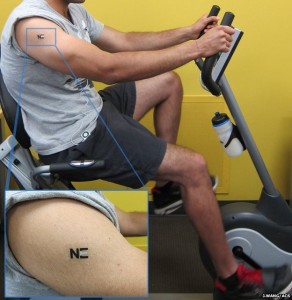Power through perspiration. That is the idea behind the new temporary tattoo that can store and generate electrical energy from your own sweat.
This new method was announced at the American Chemical Society meeting by Dr. Wenzhao Jia of the University of California, San Diego.
According to Jia’s explanation of the device in the journal Angewante Chemie, the temporary tattoo essentially acts as a sensor that measures the body’s lactate levels, which are the chemicals naturally present in sweat. From there, an enzyme in the sensor strips electrons from, which generates an electrical current. The current is then stored in a battery that is also built into the sensor.
While this method is completely innovative, the measurement of lactate levels is not a new process.
This from Newsweek:
Professional athletes monitor their lactate during performance testing as a way to evaluate their fitness and training program (in general, the higher the lactate level, the higher the workout intensity). In addition, doctors measure lactate during exercise testing of patients for heart or lung disease, which are marked by abnormally high lactate levels.
Along with being the first skin-level sensor for this process, Dr. Jia explains the true ingenuity of the method in the journal Angewante Chemie.
“Our device is the first to use sweat. It’s a proof of concept,” says Jia.
While the device does not have the power to fuel large electrical demands, it does generate enough current to power sensors, pacemakers, and other on-body devices. Though, Jia is hopeful that one day, your sweat may be able to power your cellphone or other devices.
“The current produced is not that high, but we are working on enhancing it so that eventually we could power some small electronic devices,” Jia says.
Take a look at this video detailing the process published by the American Chemical Society:
Check out some more of Dr. Jia’s work in ECS’s Digital Library.


